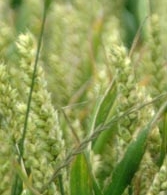
Team 07-0001
 |
 |
 |
Robots in Agriculture
Ever since the start of mankind, people have struggled to find ways to produce enough food for themselves. Farming started just as small gardens that grew cucumbers, turnips, and other food plants, but slowly evolved into the larger farming industries we see today. People added farming to their food gathering jobs, which included hunting and fishing as well, and began settling in wide expanses of land on which they could grow their own food. They refined their technique, learned about which seeds could grow where and what the specific requirements for different plants were, and before long, they made farming one of their primary food sources.
Not only could they farm and grow their own food, but they could also grow cotton, tobacco, and other crops that could trade for money and other goods. Thus, the problem about food and money was solved; farming was also rather safer than hunting, though it was far more tedious and took much more patience. After a few years, about 90% of all the overall population were farmers [1]. Now, however, with the new technology advances and various other jobs that offer a larger salary, only 3% of the population are farmers, yet they are still able to produce enough fiber and food for most of America and even some countries out past America's boundaries! [2]
But farming also has many drawbacks. It is backbreaking work to plant and harvest crops, and it takes many long and strenuous hours to finish. The only tools that the early farmers had were simple tools that were mostly hand-made; some of the times, such as during planting and harvesting, they just used their hands. Farmers usually had to hunch over for a very long time, which resulted in many back and hand injuries. Farmers were also very hard-pressed to produce enough food for their entire family/colony/city. They had a hard life, and are the reason we are here today.
Purpose:
This website will take you through the ancient times of farming, through the present, and then a bit into the future. You will experience the lives of the farmers and what tools they used to farm, how hard their lives were, and the new inventions that helped to make their jobs easier--or at least, less stressful.